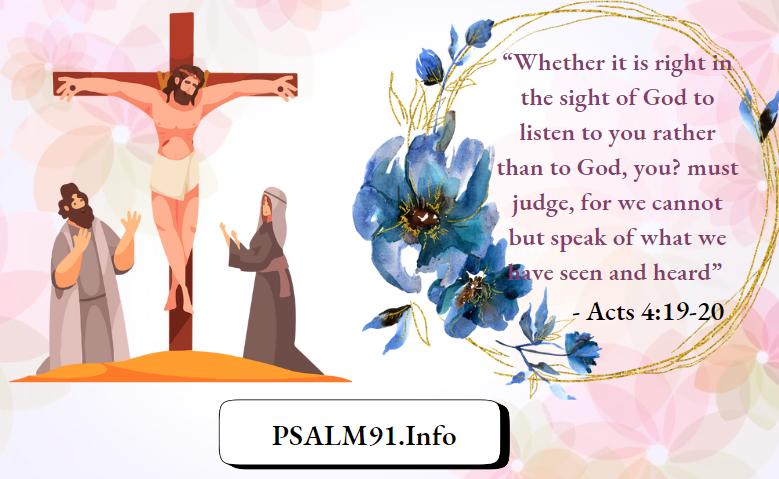Persecution And Martyrdom (Acts 4-7)
Opposition From Religious Leaders
Introduction To Persecution And Martyrdom:
The narrative of opposition from religious leaders within the early Christian community unfolds in the context of the Church’s growth and the increasing challenges it faces.
The healing of the lame beggar by Peter and John, along with their bold proclamation of Jesus Christ, draws the attention of the religious authorities, particularly the high priest and the Sadducees.
The religious leaders became central figures in the opposition faced by the early Church, setting the stage for a period of persecution and martyrdom.
The Arrest Of Peter And John:
The apostles’ unwavering commitment to boldly proclaim the Gospel and their refusal to remain silent about Jesus Christ lead to their arrest by the religious authorities.
The motivation behind this arrest is rooted in the religious leaders’ disturbance over the teachings about Jesus and His resurrection. This initial instance of persecution serves as a pivotal test of the early Church’s resilience and determination to fulfill its mission in the face of opposition.

Peter And John’s Defense:
Peter and John are brought before the religious council for questioning and to provide an account of their actions. In their defense, Peter emphasizes the miraculous healing of the lame man through the powerful name of Jesus Christ.
Their response reflects their unwavering commitment to spreading the Gospel message, even in the face of opposition and potential consequences.
The Reaction Of The Council:
The religious leaders acknowledge Peter and John as uneducated and ordinary men, yet they also recognize the boldness and confidence with which they speak. In response to the apostles’ continued proclamation of Jesus, the council orders them not to speak or teach in the name of Jesus.
However, the apostles firmly refuse to comply with this command, prioritizing their obedience to God over human authority. This intensifies the conflict between the early Church and the religious leaders, setting the stage for further opposition and persecution.
Stephen’s Role In The Persecution:
Stephen emerges as a prominent figure within the early Church, described as a man full of faith and the Holy Spirit. His teachings and powerful signs also lead to opposition from religious leaders, particularly the synagogues.
The boldness of Stephen’s witness and his subsequent trial before the religious council become a turning point in the narrative, paving the way for significant events in the early Church’s history.
Opposition From Religious Leaders Application In Modern Life:
The narrative of opposition from religious leaders within the early Church serves as a poignant reminder of the challenges and opposition that believers have faced throughout history.
It encourages modern Christians to remain steadfast in their faith and unwavering in their commitment to spreading the Gospel, even when faced with opposition and persecution.
The story of Stephen’s unwavering boldness challenges contemporary believers to stand firm in their convictions, even if it leads to hardship or adversity, recognizing that the mission of the Church often involves facing opposition while remaining faithful to the message of Christ.
This lesson should prompt participants to consider the early Church’s experience of persecution and opposition from religious leaders and reflect on the modern application of their resilience, boldness, and commitment to the Gospel in the face of challenges and persecution.
The Courage Of The Apostles
The apostles of the early Church demonstrated remarkable courage in the face of opposition and persecution. Their unwavering faith and determination to spread the Gospel, even when threatened by religious authorities, provide a compelling example for modern believers.
The Apostles’ Unwavering Faith:
The Apostles’ courage was deeply rooted in their unwavering faith in Jesus Christ. Despite being arrested and confronted by the religious authorities, they remained resolute in their commitment to the Gospel.
Their faith was not based on mere ideology but on personal encounters with the risen Christ and the indwelling of the Holy Spirit. This profound faith empowered them to endure trials and tribulations, setting a significant example for believers today.
Their lives challenge us to reflect on the depth of our own faith and its impact on our courage to live out our beliefs.
Boldness In The Face Of Threats:
Faced with the command from the religious leaders not to speak or teach in the name of Jesus, the apostles responded with unwavering boldness.

This courageous response demonstrated their unwavering commitment to sharing the life-transforming message of the Gospel. Their refusal to be silenced inspires us to prioritize our commitment to Christ over any opposition or threat.
Prioritizing Obedience To God:
The apostles’ courage was marked by their resolute choice to obey God rather than human authorities. Their deep conviction stemmed from their understanding that they were following God’s calling to proclaim salvation through Jesus Christ.
This example challenges modern believers to prioritize obedience to God’s Word and mission above all else. It serves as a reminder that courageous faith is grounded in an unwavering commitment to God’s purpose and will.
Empowerment By The Holy Spirit:
The courage of the apostles was not dependent on their human strength but on the empowerment of the Holy Spirit. The Holy Spirit provided them with the boldness to speak truthfully and fearlessly, even in the face of persecution.
Their lives underscore the importance of seeking the guidance and strength of the Holy Spirit in our own journey of faith. Their example encourages us to rely on the Spirit’s empowerment for courage, wisdom, and endurance in the midst of challenges.
Facing Opposition With Grace:
Notably, the apostles did not respond to threats and persecution with anger or aggression. Instead, they maintained a sense of grace and peace. Their actions reflected the teachings of Jesus, who emphasized love and forgiveness for one’s enemies.
In the face of opposition, the apostles embodied a Christ-like response, demonstrating that courage can coexist with grace. Their example encourages modern believers to respond to adversity with a spirit of love and forgiveness.
The Courage Of The Apostles Application In Modern Life:
The courage of the apostles serves as a powerful challenge to modern Christians to boldly proclaim their faith and live out the Gospel even in challenging times. It reminds us that true courage is anchored in faith, empowered by the Holy Spirit, and prioritizes obedience to God.
The apostles’ example inspires us to face opposition with grace and love, demonstrating the transformative impact of a Christ-centered life.
This part of the lesson should encourage participants to reflect on the courage of the apostles in the face of persecution, drawing inspiration from their unwavering faith, boldness, and reliance on the Holy Spirit. It should also prompt discussion on how to apply these principles in modern contexts.
Stephens Martyrdom And Forgiveness
Stephen, a man described as full of faith and the Holy Spirit, emerges as a prominent figure in the early Christian community. His teachings and powerful signs soon draw the attention of religious leaders, particularly those within the synagogues, leading to a significant confrontation and his eventual martyrdom.
Introduction To Stephen:
Stephen’s character and faith set him apart as a remarkable individual within the early Church. Filled with faith and the Holy Spirit, he embodies the qualities of a devoted believer.
His emergence as a central figure in the early Christian community foreshadows the pivotal role he will play in the unfolding narrative.
Stephen’s Arrest And Trial:
As Stephen’s influence grows, he becomes the target of opposition. He is arrested and brought before the Sanhedrin, the religious council of the time.
The charges against him, which include blasphemy against Moses and God and speaking against the temple and the law, reflect the increasing hostility toward the Christian message. Stephen’s trial highlights the intensifying clash between emerging Christian beliefs and established religious authorities.
Stephen’s Defense:
Stephen’s defense before the Sanhedrin spans the entirety of Acts 7. His speech is a comprehensive recounting of Israel’s history and God’s faithfulness.
He emphasizes a recurring pattern throughout Israel’s history: resistance and rejection of God’s chosen leaders and messengers. Stephen’s speech serves as a powerful witness to the continuity of God’s redemptive plan through Jesus Christ.
It establishes a profound connection between the Old Testament and the teachings of Jesus, reinforcing the Christian message.
The Stoning Of Stephen:
Stephen’s bold and uncompromising speech enrages the religious leaders, who respond by dragging him out of the city with the intent to execute him.
Remarkably, even in the face of imminent death, Stephen remains filled with the Holy Spirit. As he gazes into heaven, he witnesses a vision of Jesus at the right hand of God. His unwavering faith and the supernatural experience he undergoes serve as a testament to the sustaining power of God even in the direst circumstances.
Forgiveness In The Face Of Death:
Perhaps the most profound moment of Stephen’s story is his act of forgiveness as he is being stoned to death. His final words, echoing the words of Jesus on the cross, are a plea to God: “Lord, do not hold this sin against them.”
In the throes of persecution and death, Stephen exemplifies Christ-like love and grace. His forgiveness towards those who are taking his life is a powerful demonstration of the transformative impact of faith in Jesus.
Stephens Martyrdom And Forgiveness Application In Modern Life:
Stephen’s martyrdom challenges modern Christians to stand firm in their faith and commitment to Christ, even in the face of severe opposition.
His example of extending forgiveness in the midst of suffering serves as a compelling reminder of the transformative power of Christ’s teachings. Stephen’s story inspires us to view martyrdom not as a defeat but as a powerful witness to the enduring and life-changing message of Christ, even in the most adverse circumstances.
This part of the lesson should lead participants to contemplate Stephen’s martyrdom, his act of forgiveness, and the powerful witness it provides. It should inspire discussion on how modern Christians can apply these principles in their own lives and contexts.
